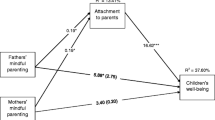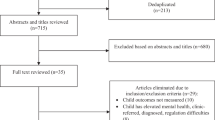Abstract
Objectives
Mindful parenting interventions have shown to be positively associated with mental health of both parents and children in clinical settings. However, there is limited research on the links between mindful parenting and parents’ and children’s social-emotional well-being in community samples. The current study aimed to explore the mutual role of mindful parenting on parents’ subjective well-being and children’s emotional regulation in a community sample. We also sought to further examine the mediating role of perceived parenting daily hassles to explain these relationships in a sample of parents with healthy preschoolers.
Methods
Four hundred and ninety-four parents of preschool children (58.3% boys; the mean age = 5.08, SD = 1.15) completed questionnaires assessing mindful parenting, parenting daily hassles, overall life satisfaction, positive and negative feelings, and their children’s emotional regulation.
Results
We found that mindful parenting was related to higher levels of parents’ overall subjective well-being and children’s emotional regulation and lower levels of perceived parenting daily hassles. A decrease in perceived parenting daily hassles may serve as an explanation for the associations between mindful parenting and parents’ subjective well-being and children’s emotional regulation.
Conclusions
This research helped us better understand the associations of mindful parenting with parents’ subjective well-being and children’s emotional regulation through perceived parenting daily hassles among community samples.

Similar content being viewed by others
Data Availability
All data are available at the Open Science Framework (OSF | The Mutual Role of Mindful Parenting on Parents’ Subjective Well-being and Young Children’s Emotional Regulation through Reducing Perceived Parenting Daily Hassles).
References
Belsky, J., & Fearon, R. M. P. (2004). Exploring marriage–parenting typologies and their contextual antecedents and developmental sequelae. Development and Psychopathology, 16(03), 501–523.
Bluth, K., & Wahler, R. G. (2011a). Does effort matter in mindful parenting? Mindfulness, 2, 175–178.
Bluth, K., & Wahler, R. G. (2011b). Parenting preschoolers: Can mindfulness help? Mindfulness, 2, 282–285.
Bögels, S., & Restifo, K. (2014). Mindful parenting: A guide for mental health practitioners. Springer.
Bögels, S. M., Hellemans, J., Deursen, S. V., Römer, M., & Meulen, R. V. D. (2014). Mindful parenting in mental health care: Effects on parental and child psychopathology, parental stress, parenting, coparenting, and marital functioning. Mindfulness, 5(5), 536–551.
Bruin, E. I. D., Zijlstra, B. J., Geurtzen, N., van Zundert, R. M., van de Weijer-Bergsma, E., Hartman, E. E., Nieuwesteeg, A. M., Duncan, L. G., & Bögels, S. M. (2014). Mindful parenting assessed further: Psychometric properties of the Dutch version of the interpersonal mindfulness in parenting scale (IM-P). Mindfulness, 5(2), 200–212.
Bücker, S., Nuraydin, S., Simonsmeier, B. A., Schneider, M., & Luhmann, M. (2018). Subjective well-being and academic achievement: A meta-analysis. Journal of Research in Personality, 74, 83–94.
Burgdorf, V., Szabó, M., & Abbott, M. J. (2019). The effect of mindfulness interventions for parents on parenting stress and youth psychological outcomes: A systematic review and meta-analysis. Frontier in Psychology, 10, 1–27.
Busseri, M., & Sadava, S. (2011). A review of the tripartite structure of subjective well-being: Implications for conceptualization, operationalization, analysis, and synthesis. Journal of Personality, 15(3), 290–314.
Cachia, R. L., Anderson, A., & Moore, D. W. (2016). Mindfulness, stress and well-being in parents of children with autism spectrum disorder: A systematic review. Journal of Child and Family Studies, 25, 1–14.
Clair, A. (2012). The relationship between parent’s subjective well-being and the life satisfaction of their children in Britain. Child Indicators Research, 5(4), 631–650.
Coplan, R. J., Bowker, A., & Cooper, S. M. (2003). Parenting daily hassles, child temperament, and social adjustment in preschool. Early Childhood Research Quarterly, 18, 376–395.
Corthorn, C. (2018). Benefits of mindfulness for parenting in mothers of preschoolers in Chile. Frontiers in Psychology, 9, 1143.
Corthorn, C., & Milicic, N. (2015). Mindfulness and parenting: A correlational study of non-mediating mothers of preschool children. Journal of Child and Family Study, 25, 1672–1683.
Crnic, K. A., & Booth, C. L. (1991). Mothers’ and fathers’ perceptions of daily hassles of parenting across early childhood. Journal of Marriage and Family, 53, 1042–1050.
Crnic, K. A., & Greenberg, M. (1990). Minor parenting stresses with young children. Child Development, 61, 1628–1637.
Crnic, K. A., Gaze, C., & Hoffman, C. (2005). Cumulative parenting stress across the preschool period: Relations to maternal parenting and child behavior at age 5. Infant and Child Development, 14, 117–132.
Diener, E. D., Emmons, R. A., Larsen, R. J., & Griffin, S. (1985). The satisfaction with life scale. Journal of Personality Assessment, 49, 71–75.
Diener, E. D., Wirtz, D., Tov, W., Kim-Prieto, C., Choi, D., Oishi, S., & Diener, R. B. (2010). New well-being measures: Short scales to assess flourishing and positive and negative feelings. Social Indicators Research, 97, 143–156.
Duncan, L. G., Coatsworth, J. D., & Greenberg, M. T. (2009). A model of mindful parenting: Implications for parent–child relationships and prevention research. Clinical Child and Family Psychology Review, 12(3), 255–270.
Duncan, L. G., Coatsworth, J. D., Gayles, J. G., Geier, M. H., & Greenberg, M. T. (2015). Can mindful parenting be observed? Relations between observational ratings of mother–youth interactions and mothers’ self-report of mindful parenting. Journal of Family Psychology, 29(2), 276–282.
Finegood, E. D., Raver, C. C., DeJoseph, M. L., & Blair, C. (2017). Parenting in poverty: Attention bias and anxiety interact to predict parents’ perceptions of daily parenting hassles. Journal of Family Psychology, 31, 51–60.
Garland, E. L., Farb, N. A., Goldin, P. R., & Fredrickson, B. L. (2015). Mindfulness broadens awareness and builds eudaimonic meaning: A process model of mindful positive emotion regulation. Psychological Inquiry, 26(4), 293–314.
Han, Z. R., Ahemaitijiang, N., Yan, J., Hu, X., Parent, J., Dale, C., Dimarzio, K., & Singh, N. N. (2021). Parent mindfulness, parenting and child psychopathology in China. Mindfulness, 12, 334–343.
Hansen, T. (2012). Parenthood and happiness: A review of folk theories versus empirical evidence. Social Indicators Research, 108, 29–64.
Kabat-Zinn, J. (2003). Mindfulness-based interventions in context: Past, present, and future. Clinical Psychology: Science and Practice, 10(2), 144–156.
Kabat-Zinn, J., & Kabat-Zinn, M. (1997). Everyday blessings: The inner work of mindful parenting. Hyperion.
Kline, R. B. (2010). Principles and practice of structural equation modeling (3rd ed.). Guilford Press.
Laurent, H. K., Duncan, L. G., Lightcap, A., & Khan, F. (2016). Mindful parenting predicts mothers’ and infants’ hypothalamic-pituitary-adrenal activity during a dyadic stressor. Developmental Psychology, 53(3), 417–424.
MacKinnon, D. P., Lockwood, C. M., & Williams, J. (2004). Confidence limits for the indirect effect: Distribution of the product and resampling methods. Multivariate Behavioral Research, 39(1), 99–128.
Mazur, E. (2006). Biased appraisals of parenting daily hassles among mothers of young children: Predictors of parenting adjustment. Cognitive Therapy and Research, 30, 161–175.
McKee, L. G., Parent, J., Zachary, C., & Forbhand, R. (2018). Mindful parenting and emotion socialization practices: Concurrent and longitudinal associations. Family Process, 57, 752–766.
Mensah, F. K., & Kiernan, K. E. (2010). Parents’ mental health and children’s cognitive and social development families in England in the millennium cohort study. Social Psychiatry & Psychiatric Epidemiology, 45(11), 1023–1035.
Meppelink, R., Bruin, E. I. D., Wanders-Mulder, F. H., Vennik, C. J., & Bögels, S. M. (2016). Mindful parenting training in child psychiatric settings: Heightened parental mindfulness reduces parents’ and children’s psychopathology. Mindfulness, 7(3), 1–10.
Metler, S. J., & Busseri, M. A. (2017). Further evaluation of the tripartite structure of subjective well-being: Evidence from longitudinal and experimental studies. Journal of Personality, 85(2), 192–206.
Morris, A. S., Silk, J. S., Steinberg, L., Myers, S. S., & Robinson, L. R. (2007). The role of the family context in the development of emotion regulation. Social Development, 16(2), 361–388.
Musick, K., Meier, A., & Flood, S. (2016). How parents fare: Mothers’ and fathers’ subjective well-being in time with children. American Sociological Review, 81, 1069–1095.
Podsakoff, P. M., MacKenzie, S. B., & Podsakoff, N. P. (2012). Sources of method bias in social science research and recommendations on how to control it. Annual Review of Psychology, 63, 539–569.
Potharst, E. S., Aktar, E., Rexwinkel, M., Rigterink, M., & Bögels, S. M. (2017). Mindful with your baby: Feasibility, acceptability, and effects of a mindful parenting group training for mothers and their babies in a mental health context. Mindfulness, 8(5), 1236–1250.
Ren, Y., Han, Z. R., Ahemaitijiang, N., & Zhang, G. (2021). Maternal mindfulness and school-age children’s emotion regulation: Mediation by positive parenting practices and moderation by maternal perceived life stress. Mindfulness, 12, 306–318.
Shields, A., & Cicchetti, D. (1997). Emotion regulation among school-age children: The development and validation of a new criterion q-sort scale. Developmental Psychology, 33(6), 906–916.
Shorey, S., & Ng, E. D. (2021). The efficacy of mindful parenting interventions: A systematic review and meta-analysis. International Journal of Nursing Studies, 121, 103996.
Singh, N. N., Lancioni, G. E., Winton, A. S. W., Fisher, B. C., Wahler, R. G., Mcaleavey, K., Singh, J., & Sabaawi, M. (2006). Mindful parenting decreases aggression, noncompliance, and self-injury in children with autism. Journal of Emotional and Behavioral Disorders, 14(3), 169–177.
Singh, N. N., Lancioni, G. E., Winton, A. S., Singh, J., Curtis, W. J., Wahler, R. G., & McAleavey, K. M. (2007). Mindful parenting decreases aggression and increases social behavior in children with developmental disabilities. Behavior Modification, 31(6), 749–771.
Singh, N. N., Lancioni, G. E., Winton, A. S. W., Singh, J., Singh, A. N., Adkins, A. D., & Wahler, R. G. (2010). Training in mindful caregiving transfers to parent–child interactions. Journal of Child and Family Studies, 19(2), 167–174.
Singh, N. N., Lancioni, G. E., Winton, A. S. W., Karazsia, B. T., Myers, R. E., Latham, L. L., & Singh, J. (2014). Mindfulness-based positive behavior support (MBPBS) for mothers of adolescents with autism spectrum disorder: Effects on adolescents’ behavior and parental stress. Mindfulness, 5, 646–657.
Stone, L. L., Mares, S. H. W., Otten, R., Engels, R. C. M. E., & Janssens, J. M. A. M. (2016). The co-development of parenting stress and childhood internalizing and externalizing problems. Journal of Psychopathology and Behavioral Assessment, 38, 76–86.
Sturge-Apple, M. L., Davies, P. T., Cicchetti, D., & Fittoria, M. G. (2014). A typology of interpartner conflict and maternal parenting practices in high-risk families: Examining spillover and compensatory models and implications for child adjustment. Development and Psychopathology, 26, 983–998.
Wang, M., Zou, H., Zhang, W., & Hou, K. (2019). Emotional intelligence and subjective well-being in Chinese university students: The role of humor styles. Journal of Happiness Studies, 20(4), 1163–1178.
Zhang, W., Wang, M., & Ying, L. (2019). Parental mindfulness and preschool children’s emotion regulation: The role of mindful parenting and secure parent-child attachment. Mindfulness, 10, 2481–2491.
Acknowledgements
We are grateful to the support from the Principal of Wu-Tong-Yuan Kindergarten, Wuhan, Hubei, Qiong Zhang, and all the families participating in our study.
Funding
This study was funded by “the key project of medical scientific research from Wuhan Municipal Health Commission” (grant number WG20B05) and “the Fundamental Research Funds for the Central Universities” (grant number 113–413000007).
Author information
Authors and Affiliations
Contributions
WZ designed and executed the study, analyzed the data, wrote the first draft of the manuscript, and collaborated with the revised manuscript. TL and SZ revised the first draft critically for important intellectual content, and contributed significantly to the writing and editing of the final manuscript. XL collaborated in analyzing the data and editing of the manuscript.
Corresponding author
Ethics declarations
Ethical Approval
All procedures performed in studies involving human participants were approved by the Institutional Review Board of Wuhan University.
Informed Consent
Informed consent was obtained from all individual participants included in the study.
Conflict of Interest
The authors declare no competing interests.
Additional information
Publisher's Note
Springer Nature remains neutral with regard to jurisdictional claims in published maps and institutional affiliations.
Rights and permissions
Springer Nature or its licensor holds exclusive rights to this article under a publishing agreement with the author(s) or other rightsholder(s); author self-archiving of the accepted manuscript version of this article is solely governed by the terms of such publishing agreement and applicable law.
About this article
Cite this article
Zhang, W., Liu, T., Zhang, S. et al. The Mutual Role of Mindful Parenting on Parents’ Subjective Well-being and Young Children’s Emotional Regulation Through Reducing Perceived Parenting Daily Hassles. Mindfulness 13, 2777–2787 (2022). https://doi.org/10.1007/s12671-022-01994-5
Accepted:
Published:
Issue Date:
DOI: https://doi.org/10.1007/s12671-022-01994-5




